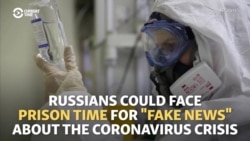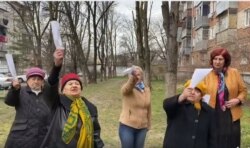As Russia’s coronavirus cases spike to over 106,000, journalists for the country’s handful of independent media outlets charge that Russian prosecutors are using anti-fake-news regulations to target reporting critical of the government’s handling of the COVID-19 pandemic.
As of April 1, Russia’s Criminal Code has authorized prosecutors to launch criminal investigations into the public dissemination of “knowingly” false information that damages the health or causes the death of an individual. Depending on the case, potential fines range from 300,000 rubles (about $4,061) to 2 million rubles (about $27,072). A prison sentence of three to five years, as well as terms of “corrective” or “compulsory” labor up to two years, can also be imposed.
In an April 28 letter to their audiences, the 25 members of Syndicate-100, a collective of independent Russian news outlets led by Novaya Gazeta, charged that regional prosecutors and police officials are using these regulations to pressure media that highlight officials’ shortcomings in response to the coronavirus pandemic.
“Independent and justifiable information enrages those who, wielding authority during a crisis situation, handle their work badly,” the journalists wrote.
Rather than false information, the provisions “are aimed against information as such,” they concluded.
Over the past month, prosecutors appear to have opened dozens of criminal cases into allegedly false information about the COVID-19 pandemic spread via websites, social media, or messaging apps. In some instances, regional police have posted online "self-criticism" videos of fined individuals who admit their wrongdoing.
To date, most of these cases do not appear to involve news media. Two instances, however, stood out to Syndicate-100 as potentially foreshadowing the future for Russia's journalists.
One targets an interview conducted by St. Petersburg journalist Tatiana Voltskaya with an anonymous reanimation specialist who reported a critical lack of physicians and medical equipment in the city’s hospitals. At the doctor’s request, Voltskaya did not reveal his identity. Investigators are demanding the recording of their conversation, however.
Voltskaya works as a freelance journalist for the Russian Service of Radio Free Europe/Radio Liberty, which also manages Current Time in association with the Voice of America.
Russia’s state communications regulator, Roskomnadzor, has stated that it will block online access to Voltskaya’s story for “containing appeals to mass riots, extremist activities, and participation in mass (public) actions held with infringement of the established order. “
Russian medical personnel frequently request anonymity when interviewed about the coronavirus pandemic since, they say, they risk losing their jobs or becoming part of a criminal investigation if identified by name.
On April 28, Russian President Vladimir Putin also acknowledged that shortages of protective face masks, COVID-19 tests, medicine, and medical equipment exist despite increased domestic production and imports. He tasked the Ministry of Industry and Trade to increase daily domestic production of such items and to strictly ensure that all available resources are used.
Some of the president’s most fervent supporters agree that Russia faces a challenge fighting the pandemic yet reposting their remarks already has brought the threat of a 500,000-ruble ($6,754) fine to one regional TV station.
In late March, the non-government-aligned TV channel TVK, based in the Siberian city of Krasnoyarsk, reposted a video that shows several local members of Putin’s Troops (Otryady Putina), a collective of hardcore, elderly Putin fans, energetically circling pieces of folded paper in the air to “destroy” the coronavirus.
According to an excerpt of the official notice published by TVK, prosecutors charged that the video, first released on March 6, had falsely asserted that the virus does not exist and accused “leaders of the USA” of inventing the virus to weaken the world economy.
Roskomnadzor blocked access to the video on TVK’s YouTube channel, but it still remains accessible on the YouTube account of Putin’s Troops. It no longer contains any reference to U.S. President Donald Trump or to the non-existence of the coronavirus, however.
TVK Editor-in-Chief Maria Bukhtuyeva commented that the regulations to fight fake news about the pandemic are playing “a bad joke on all mass media.” Though media more independent from the government appear to receive more attention from prosecutors, “Everyone falls into the same zone of risk,” she said.
Nonetheless, some observers believe that exceptions exist for this zone. A “doublethink” about what constitutes acceptable information exists in Russia, noted anthropologist Aleksandra Arkhipova a senior researcher at the Russian Presidential Academy of National Economy and Public Administration who is tracking the spread of fake news.
On April 24, she pointed out, Channel One, a state-run broadcaster, detailed allegations that Microsoft founder Bill Gates had allegedly thought up the virus. The pro-government news site Lenta.ru published a story that thieves are using medical masks laced with narcotics to pose as local officials and rob residents of the Kuban region.
Though both reports are fake, prosecutors do not appear to have held either outlet accountable.
“For some, the law is written; for others, it’s not written,” Arkhipova commented.
But the Kremlin maintains that it has no interest in censorship.
Sites touting supposed “100-percent guaranteed” medicine for the coronavirus or selling alleged vaccines are also among those targeted by prosecutors.
“We need to decisively fight against fakes, with the distribution of information that is capable of harming people’s situations, health,” presidential spokesman Dmitry Peskov stated on April 29.
“But this should not in any way limit qualified, objective information. This is very important.”
Russia ranked 149th out of 180 countries evaluated in Reporters Without Borders’ recently released 2020 World Press Freedom Index. Among other shortcomings, the Paris-based non-profit organization cited a “[s]tifling atmosphere for independent journalists.”
--With additional reporting from Izvestia and TASS







Facebook Forum